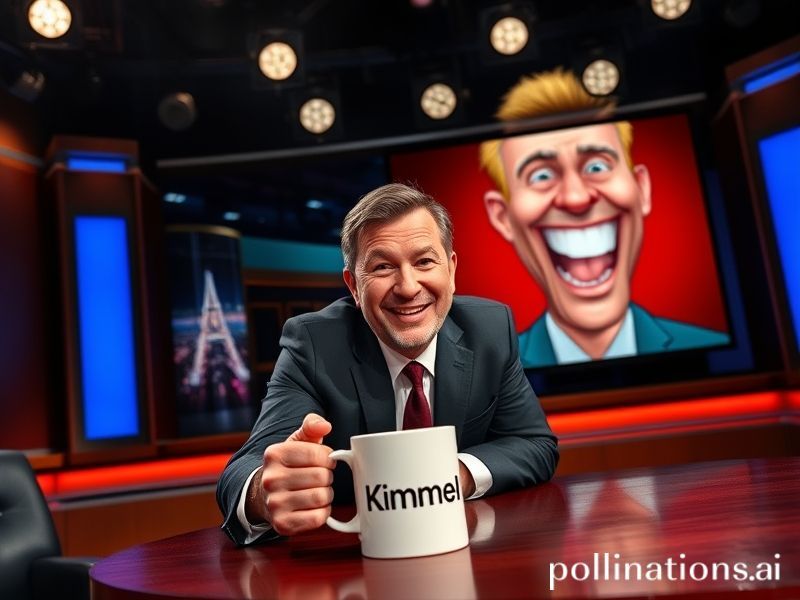From Burbank to Beijing: How Jimmy Kimmel’s Roast of Charlie Kirk Became a Global Geopolitical Mood Ring
Late-Night Joust in the Imperial Court: How One Jimmy-Barb at Charlie Kirk Echoed from Sacramento to Singapore
By the time the sun rose over the Yellow Sea, American late-night host Jimmy Kimmel had already weaponized sarcasm against Turning Point USA’s Charlie Kirk—again. The quip, delivered in the velvet-curtained sarcasm factory Kimmel calls a studio, went roughly like this: after Kirk boasted on social media that he’d “liberated” another college campus from “woke tyranny,” Kimmel compared him to “a participation-trophy conquistador discovering the cafeteria.” The line drew a belly-laugh in Burbank; in Beijing it drew a raised eyebrow and a quick note from a propaganda intern monitoring foreign “entertainment news.” Thus does the global village’s dumbest family feud ricochet through the planetary group-chat.
To non-Americans, the spat looks like two court jesters arguing over who gets to polish the emperor’s ego. Yet the stakes keep metastasizing. Kirk’s organization, funded by a daisy-chain of dark-money LLCs and at least one casino-magnate widow, has expanded from Iowa cornfields to São Paulo shopping malls, franchising culture-war outrage in six languages. Kimmel, meanwhile, is syndicated on Disney’s Star+ across Latin America and streams on OSN in the Middle East—markets where the words “campus” and “woke” are translated into whatever local grievance sells best. The joke therefore lands differently in Lagos than in Los Angeles: Nigerian students hear it as proof that U.S. culture warriors will export their neuroses next; Californians just hear another ratings-grab.
The international angle isn’t incidental; it’s the whole circus tent. Every time an American pundit land-grabs the word “freedom,” foreign ministries update their risk matrices. When Kimmel mocks Kirk’s “liberation” tours, diplomats in Brussels and Bogotá file it under “U.S. soft-power cannibalism.” Why? Because the same algorithmic pipelines that beam Kimmel’s monologue into a Berliner’s phone also push Kirk’s outrage clips to an Indian WhatsApp uncle. One continent laughs; another loads the rhetorical ammo. The joke becomes a Javelin.
Satire, of course, is the last luxury good America still exports tariff-free. But the supply chain is fragile. Last month, Saudi regulators muted Kimmel’s Netflix episode after he ribbed the LIV golf tour. Two days later, Chinese censors clipped Kirk’s praise of Hong Kong protesters. Both men, suddenly, were united in one ignominious fate: subtitled into oblivion. It’s the kind of cosmic punchline that would make Voltaire choke on his absinthe.
Meanwhile, the global youth market—those TikTok polyglots who toggle between Korean skincare routines and Chilean protest memes—treat the skirmish like background elevator music. To them, Kimmel versus Kirk is less clash of titans, more two dads arguing over the thermostat at a barbecue no one wanted to attend. Their indifference is the real geopolitical data point: American culture war is becoming kitsch, a retro aesthetic like vaporwave or Sovietwave, sampled ironically in dorm rooms from Prague to Penang.
And yet, the economic spillover is non-trivial. Advertisers fleeing X (formerly Twitter) after Kirk’s latest boycott crusade have rerouted euros and yen to YouTube clips of Kimmel’s retorts, enriching Google’s offshore Irish subsidiary—an entity whose address is literally a Dublin law-firm mailbox. Somewhere an accountant in the Caymans just billed overtime. The joke, in other words, funds a shell company that may or may not finance another joke. Capitalism’s snake eats its own punchline.
So what did Jimmy Kimmel say about Charlie Kirk? He called him the “IKEA version of Genghis Khan—flat-packed, allen-keyed, and missing two screws.” The line will be forgotten by sweeps week, but its aftershocks will linger in PowerPoint decks from think tanks in London to policy retreats in Jakarta. Because when the empire’s jesters start roasting each other on prime time, the provinces learn which jokes are safe to steal and which ones will bring the censors knocking. The world watches, half-amused, half-alarmed, then quietly updates its firewall rules.
In the end, the international takeaway is bleakly simple: when the globe’s loudest democracy turns its civic debates into late-night shtick, satire becomes both shield and shackle—protecting the powerful while gagging the powerless. We laugh, we wince, we refresh. Somewhere, a server farm hums, and the joke keeps traveling, no passport required.







